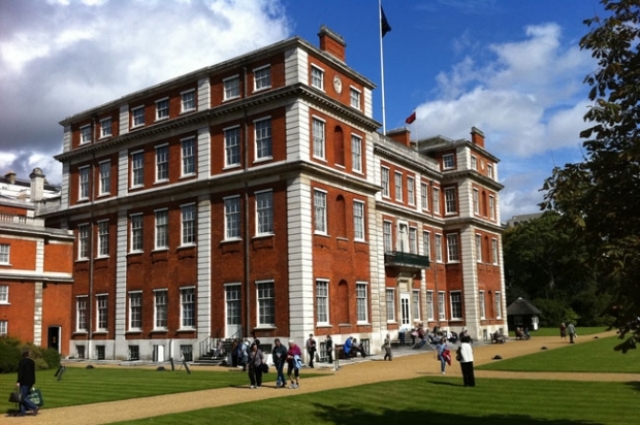 Marlborough House [photo: Commonwealth Secretariat]
Marlborough House [photo: Commonwealth Secretariat]
[This is an excerpt from an article in The Round Table: The Commonwealth Journal of International Affairs.]
Introduction
Palestine, as stated by the 1997 Commonwealth Heads of Government Meeting (CHOGM) when welcoming but not immediately taking forward Palestine’s interest in membership, has a strong ‘historical association with the Commonwealth’ (Commonwealth Secretariat, Citation2007, p. 18). Alongside Israel and Jordan (which was effectively governed separately as Transjordan), its entire territory once comprised the Mandate of Palestine, which was established by the League of Nations in the aftermath of the First World War and administered by the United Kingdom. An association by Mandate with an original Commonwealth member state forms the historical link for many Commonwealth members including Samoa, the host of this year’s CHOGM. Following the establishment of a truly modern multilateral Commonwealth with the formation of the Commonwealth Secretariat in 1965, the Palestinian conflict was included in the communiqués of all Commonwealth summits from the late 1960s through to the mid-1990s. It follows that it found a place on the formal Commonwealth agenda for longer, but also over much the same period, as South African apartheid – that leitmotif of Commonwealth causes and one that has spawned a significant literature including a recent authoritative book (Mole, Citation2023). However, despite this long engagement and with the notable exception of Kattan (Citation2015) putting the case in this journal for Palestinian membership, there has been no extended academic analysis of the modern Commonwealth’s relationship with Palestine.
This lacuna is understandable. First, even if some of the issues and perspectives overlapped, the Commonwealth treated the Palestinian conflict entirely differently from that in South Africa in that no pan-Commonwealth initiative was even attempted in the former case (and, it would appear from currently available records, was only ever suggested once and by one member government alone). Second, despite the Palestinian conflict remaining unresolved and ultimately becoming ever more serious, the Commonwealth has entirely disengaged from it for over a quarter of a century. This reflects not just the widely perceived hopelessness and de-prioritisation of the Palestinian conflict but more specifically the reduced capacity of a time-shrunken CHOGM and resource- and credibility-strapped Commonwealth Secretariat to engage on international issues.
Why have Gabon and Togo joined the Commonwealth?
Palestine’s Membership in the Commonwealth as a Contribution to a Lasting Peace in the Middle East
Palestine: The wider hope
Notwithstanding the limitations, it is nevertheless worthwhile to explore the engagement of the modern Commonwealth with Palestine. First, tracking the various statements in Commonwealth communiqués has significance in itself as, whatever their constraints, they do constitute concrete collective outputs from a sizeable portion of world society. Indeed, Dale (Citation1982, p. 466) goes as far as to argue that:
The proceedings of a Heads of Government Meeting do not result in mere recommendations. Since the Meeting decides by consensus, and the participants are what they are, it results in decisions to put into effect. These decisions range, in degrees, from action to attitude.
Second, an analysis of the underlying discussions from the late 1960s through to the late 1990s can elucidate how a very diverse group of countries confronted the Palestinian conflict and helped shape a common Commonwealth standpoint, however tenuous it may be. Third, this experience can provide the grounding for the Commonwealth of today positively intervening at this moment of heightened crisis. As well as addressing the drastic humanitarian situation and the need to establish the basis for political negotiations between Palestine and Israel, the forthcoming CHOGM should offer Palestine membership of the Commonwealth on terms that are not dependent on Israel or other outside factors. Conditions related to internal democracy, human rights and the rule of law must apply if Commonwealth credibility on these topics is to be restored, and the Palestinian Authority should be offered the active support of the Commonwealth Secretariat in meeting these standards.
Alongside news reports, published accounts and secondary literature, the analysis below draws on all relevant Commonwealth Prime Ministers’ Meeting/CHOGM communiqués and crucially also their underlying minutes and memoranda. Unfortunately, as a result of the thirty-year rule applied to Commonwealth archives, the latter have only been released up to the 1993 CHOGM. Nevertheless, for the period of the 1990s (and, to a very limited extent, also beyond) news reporting and published accounts are available and are drawn upon in lieu of official sources. The immediately following section frames the discussion by introducing the Palestinian conflict and outlining its general trajectory between 1967 and 1997, the period during which modern Commonwealth communiqués explicitly confronted it. The next section examines the content of those communiqués whilst the one that follows explores the extent to which the Palestinian conflict was, in fact, discussed at Commonwealth summits and the nature of that discussion. The last two main sections engage in a broader analysis of the modern Commonwealth’s engagement and then disengagement with the Palestinian conflict and argue for the Commonwealth to establish a clear, realistic and supported roadmap for Palestinian membership in the organisation. The article closes with some brief conclusions.
David Erdos is with the Faculty of Law, University of Cambridge.



